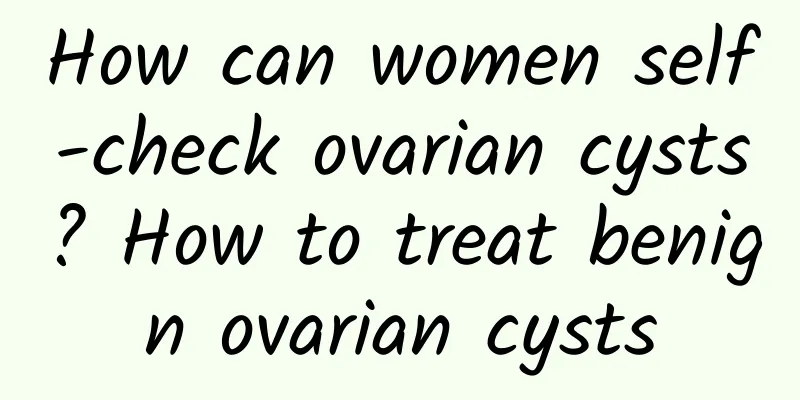Will uterine cavity separation disappear gradually in early pregnancy?

|
The occurrence of uterine separation in early pregnancy varies from woman to woman. Some women may experience it naturally as their pregnancy progresses, while others may require medical intervention. Uterine separation usually refers to an abnormal condition in the uterine cavity observed during an early pregnancy ultrasound. This may involve a buildup of fluid between part of the fetal sac and the uterine wall. Whether this phenomenon disappears or persists depends on a variety of factors, including the degree of separation, the specific cause, and the individual condition of the pregnant woman. Close observation and regular prenatal checkups are very important, and your doctor will adjust your treatment plan if necessary based on the test results. Causes of early pregnancy uterine cavity separation include genetic factors such as congenital uterine malformations, environmental factors such as long-term exposure to harmful chemicals, and physiological factors such as hormonal disorders. It may also be caused by minor trauma or infection. If the symptoms are mild and there is no bleeding or abdominal pain, it can usually be managed by waiting and watching, because small-scale separations may gradually decrease as the pregnancy progresses. However, if vaginal bleeding or severe abdominal pain occurs, it means that the situation needs to be treated immediately. Usually the attending physician will take medical treatment, such as progesterone to stabilize the pregnancy, and may also recommend bed rest to reduce the risk of miscarriage. Ultrasound examinations can help monitor changes in the uterine cavity, and the doctor may recommend other additional examinations if necessary to rule out other possible complications, such as ectopic pregnancy or hydatidiform mole. Causes of early pregnancy uterine cavity separation include genetic factors such as congenital uterine malformations, environmental factors such as long-term exposure to harmful chemicals, and physiological factors such as hormonal disorders. It may also be caused by minor trauma or infection. If the symptoms are mild and there is no bleeding or abdominal pain, it can usually be managed by waiting and watching, because small-scale separations may gradually decrease as the pregnancy progresses. However, if vaginal bleeding or severe abdominal pain occurs, it means that the situation needs to be treated immediately. Usually the attending physician will take medical treatment, such as progesterone to stabilize the pregnancy, and may also recommend bed rest to reduce the risk of miscarriage. Ultrasound examinations can help monitor changes in the uterine cavity, and the doctor may recommend other additional examinations if necessary to rule out other possible complications, such as ectopic pregnancy or hydatidiform mole. Maintaining a good lifestyle and eating habits has a positive effect on the management of early uterine cavity separation. It is recommended to have a reasonable and balanced diet and increase the intake of foods rich in folic acid, which will help promote the development of the fetal nervous system. At the same time, attention should be paid to combining work and rest, and try to avoid fatigue. If necessary, gentle yoga for pregnant women can be chosen, but everything should be done under the guidance of a doctor. Once abnormalities or discomfort occur, you should seek medical attention immediately to ensure a healthy development of the pregnancy. Regular prenatal examinations can detect abnormalities in time and prevent the situation from worsening, which also helps to ensure the healthy growth of the fetus. |
<<: Can hydatidiform mole be detected by ultrasound?
>>: How to prevent cervical hypertrophy and erosion cysts
Recommend
What should I do if my menstrual flow is heavy after childbirth?
What should I do if my menstrual flow is heavy af...
What are the symptoms of cervical erosion? There are 4 symptoms of cervical erosion.
Cervical erosion is a common disease among marrie...
Can’t lose weight even after a big meal and lots of exercise? Nutritionist: Calorie control is the key, eating strategies are a good helper for body control
As you get older, your body shape tends to become...
What are the types of pelvic inflammatory disease?
Do you know what types of pelvic inflammatory dis...
What is the standard value of the size of the ectopic gestational sac?
What is the standard size of an ectopic gestation...
Sticky discharge during menstrual period
Sticky discharge during menstrual period Menstrua...
Want to lose weight successfully? Taking photos to keep this daily record is the first step to success!
Debunking the lie of "genetic obesity" ...
Three symptoms to remind you whether you have pelvic inflammatory disease
Pelvic inflammatory disease is a gynecological di...
What are the symptoms of pelvic effusion?
Many women are troubled by pelvic effusion, so ma...
Can red guava lower blood sugar? The secret to controlling sugar: learn to replace food first
Diabetes is a troublesome disease. There are many...
What is menopause in women?
Only by knowing what menopause is can we help eve...
What to do if pregnant women have vulvar itching
Pregnant women are a group of people who need spe...
Can I get vaccinated after cervical precancerous lesions turn negative?
Yes. HPV vaccine can be administered after cervic...
Experts introduce daily methods to prevent irregular menstruation
Irregular menstruation is a disease that may lead...
What are the symptoms of uterine fibroids?
Uterine fibroids are a common benign tumor, and t...









